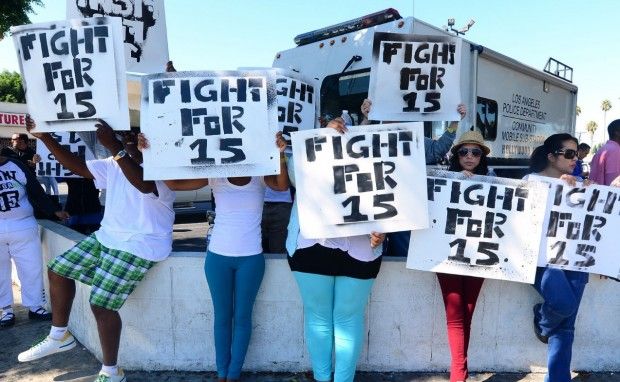CA wage hike shock waves begin
by James Poulos | April 21, 2016 5:26 am
 Confronted with an impending hike to $15 in the California minimum wage, businesses, labor advocates and political analysts have all begun to shift strategies and tactics. Given current trends, the combined impact could be a smaller, more unionized workforce — that doesn’t always see the benefits wage activists have promised.
Confronted with an impending hike to $15 in the California minimum wage, businesses, labor advocates and political analysts have all begun to shift strategies and tactics. Given current trends, the combined impact could be a smaller, more unionized workforce — that doesn’t always see the benefits wage activists have promised.
The consequences will be quick and could be dramatic. “Most state raises over the past decade, when there have been any, ranged from 1 percent to 3 percent annually. The law Gov. Jerry Brown signed will increase bottom-rung pay roughly 10 percent per year starting in January,” as the Sacramento Bee reported[1].
Manufacturing flight
One immediate result of the hikes has already appeared in Southern California, where the garment industry faces an especially rough road. Sung Won Sohn, former director of apparel company Forever 21 and economist at Cal State Channel Islands, told[2] the Los Angeles Times a veritable “exodus has begun,” with manufacturers already tempted to shift garment production overseas to retreat from the Golden State still further. “The garment industry is gradually shrinking and that trend will likely continue.”
“In the 1990s, as borders opened up, foreign competitors began snatching up business from Southland garment factories. Eventually, many big brands opted to leave the region in favor of cheaper locales. Guess Jeans, which epitomized a sexy California look, moved production to Mexico and South America. Just a few years ago, premium denim maker Hudson Jeans began shifting manufacturing to Mexico. Jeff Mirvis, owner of MGT Industries in Los Angeles, said outsourcing was necessary to keep up with low-cost rivals.”
The problem, particularly acute for business owners who can’t automate jobs as readily as, say, fast food restauranteurs, was encapsulated by Gov. Jerry Brown himself, who signed the $15 wage into law despite clear reservations about its economic wisdom. “Economically, minimum wages may not make sense,” he said[3], defending the law on moral and sociopolitical grounds. A high minimum wage, Brown claimed, “binds the community together and makes sure that parents can take care of their kids in a much more satisfactory way.”
Incentives in tension
According to critics of the change, the tension involved in using poor economic choices to encourage good moral ones has driven labor unions themselves toward a predictable, if hypocritical, shift in their own policy objectives. Many of the same unions that agitated for a higher wage “have been quietly — and often successfully — lobbying cities to let employers who hire union workers pay them less than the mandated minimum,” as Quartz observed[4]. “Unions say it gives them the flexibility to negotiate packages for their workers that supplant wages with health insurance and other benefits.
“Critics say that it’s a shrewd move by unions to drive up membership dues and ensure that their workers are the cheapest in town. The exemption gives cost-conscious employers little choice but to hire union, and workers who want jobs little choice but to join their local.”
At the same time, however, workers who have been rallied to the $15 cause have been swiftly pressed into service for pro-unionization demonstrations. “The demand from the original strikes in 2012 was $15 and a union,” said Mary Kay Henry, international president of the SEIU, according[5] to the Times. “Underpaid workers in California are now on a path to $15, but we think the way we can make these jobs good jobs […] is through a union.”
In an added twist, some economists defending the wage hikes have raised the question of whether subsequent job losses are a price worth paying. Gov. Brown, in fact, has referred favorably to that view. “We understand that this can be difficult,” he said, as the Washington Post recalled[6]. “But the fact is that there’s a principle called the living family wage, which is a doctrine that has been around for a long time, since probably before the 1900s, which is that you can’t expect someone to work if the wages for that work can’t support a family.”
- reported: http://www.sacbee.com/news/politics-government/the-state-worker/article70139177.html
- told: http://www.latimes.com/business/la-fi-garment-manufacturing-la-20160416-story.html
- said: http://www.sandiegouniontribune.com/news/2016/apr/10/california-minimum-wage-hike-uncertainty-poor/#sthash.DhUS0xv2.dpuf
- observed: http://qz.com/664484/the-one-group-unions-dont-want-getting-a-minimum-wage-in-california-union-workers/
- according: http://www.latimes.com/business/la-fi-fast-food-strike-20160414-story.html
- recalled: https://www.washingtonpost.com/news/wonk/wp/2016/04/01/the-15-minimum-wage-sweeping-the-nation-might-kill-jobs-and-thats-okay/?wpmm=1&wpisrc=nl_evening
Source URL: https://calwatchdog.com/2016/04/21/ca-wake-hike-shock-waves-begin/